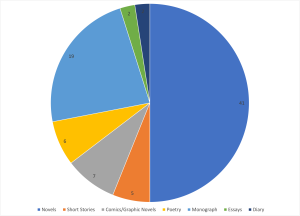In addition to the following lost, there is another post coming shortly; it’s an Unintentional Conversation that was going to be part of these recommendations, but grew too long.
One thing that has defined the last week or so for me is the release of a new album, entitled Virgins, by the electronic composer Tim Hecker— if only because it reulted in the receipt of an email from Amazon that included the phrase “Thank you for your order of Virgins.” Hecker’s last album, Ravedeath 1972, was one of my favortie releases of the last few years, and the new one is excellent as well. (There’s a lot to assimilate before I’ll be willing to say whether I like it as much as the last one or not). So, to mark that release, a couple of Hecker-related items:
Article: “Time Hecker: Attack of the Drones” by Christopher R. Weingarten
An insightful and— for SPIN these days— fairly lengthy interview with Tim Hecker, that covers how he got stared making the kind of music he makes now, his approach to live performance, and the public perception of him as a “dark” personality, among other things.
Song: “Virginal II” by Tim Hecker
And here is one of the best songs from the new record, so you can get an idea of Hecker’s sound if you are not already familiar.
And now some non-Hecker things to read:
Article: “A Hundred Bucks Says You Won’t Read This Story” by Chris Jones
Making money is hard. In this case, I mean the literal, physical production of currency— specifically, the new U.S. one hundred dollar bill. I knew counterfeiting was big business, and that there are all kinds of things in the design of currency that are supposed to make it harder, but I still found the degree of technical innovation and the hours— many hundreds of hours— of highly skilled labor that have gone into this thing astonishing.
For instance: the new bill has a blue “ribbon” on the front, running just a little off of center. That ribbon is manufactured as an integral part of the bill itself, not woven in or attached later, through a secret, proprietary process. It is one-third as thick as the paper of the note, less than five-thousandths of an inch. And, on top of that,
The ribbon itself is a collection of microscopic lenses, like the pixels on your TV, but much, much smaller. (Asked what the lenses are made of, Crane says, “Stuff. They’re made of stuff.”) On a single note, the quarter-inch-wide ribbon contains 875,000 of those lenses. When they catch the light, they magnify the icons — the 100’s and the Liberty Bells — that have been printed on the ribbon beneath them. That printing is among the smallest accomplished in the history of the world. If, instead of symbols, Crane wanted to magnify text, the font would be small enough to print the entire Bible on the surface of a single dime — twice.
And that’s not the only sophisticated anti-counterfeiting measure in the new bill. So, yeah, Just in case you were thinking about running a few of these off on the old xerox and taking a trip to Vegas.
Article: “The Case Against High-School Sports” by Amanda Ripley
In the interest of fairness, I have to acknowledge from the outset that this article resonates entirely with my personal prejudices: I think we, as a society, pay far, far, far too much attention to sports, that we spend far too much money on them (in all kinds of different ways), and that they displace any number of more important and more interesting things both in cultural prominence and in financial support.
All that said, I think the piece still makes a pretty strong case for getting rid of, or at least dramatically downsizing, sports in high school. They are far more expensive than we generally realize, with hidden costs like security at games and the fact that the student-to-faculty ratio is much lower for sports teams than for regular classes; contrary to popular belief, they almost never pay for themselves; they can dramatically reduce the amount of time that students spend in the classroom; they distract even students who don’t actually play them; and, though this is some pretty indirect evidence, the countries that are kicking our butts in education achievement (at least measured by standardized test scores) all give sports far less attention and support in high school, if they offer them at all. The evidence that Ripley presents here is, admittedly, mostly anecdotal or inferential, but at a time when we are all increasingly worried about the American education system, it is striking how unusual this argument sounds.
Article: “Faker’s Gragas is Unstoppable: Behind The Scenes At Gaming’s First Super Bowl” by Joseph Bernstein
Full disclosure: I sort of know the author of this piece. But it’s a fascinating story, for a few reasons. First of all, it describes the world championship for a video game called League of Legends, which regularly has 5 million people playing it at once; the prize for winning the championship was a million dollars, and the tournament filled the Staples Center in LA. And I had never heard of this game before— which is part of Bernstein’s point: that, for some reason, this game has been able to get very, very popular without really getting much attention from the “mainstream,” even the video game press. Which makes me wonder, not for the first time, what “mainstream” means any more. I recently listened to a discussion of the finale of Breaking Bad, in which it was pointed out that, for all the media attention the show was getting as it ended, its ratings were actually tiny compared to any major network show. All this is by way of saying that at least some niches, today, are pretty big spaces. I was also struck, apropos of the previous article, by the fact that the players of this game seem to think that the way to validate the game, and themselves as players, is to classify it as a “sport.” In any case, it’s a good story about a weird-ish sub current of video game culture, and there’s a decent chance that, like me, you knew nothing about it.


